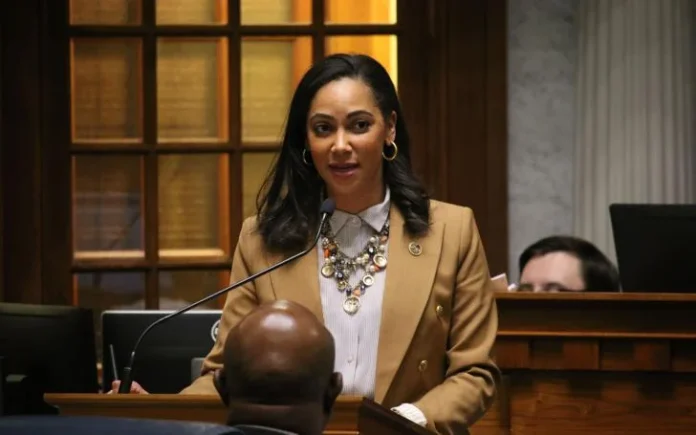Teacher collective bargaining bill heads to Gov. Holcomb
- By Xain Ballenger, TheStatehouseFile.com
- APRIL 26, 2023
The Indiana Senate voted Tuesday to concur with House amendments on a bill to make collective bargaining between school districts and teachers optional rather than mandatory in a relatively close 27-23 vote, sending it to Gov. Eric Holcomb to veto or sign into law..
Sen. Linda Rogers, R-Granger, was a co-author of SB 486 and presented it to the Senate Chamber. A number of Senators opposed the legislation; however, it passed 27-23.
Photo by Xain Ballenger, TheStatehouseFile.com
Senate Bill 486 is authored by Sen. Linda Rogers, R-Granger, Sen. Jeff Raatz, R-Centerville, and Sen. Stacey Donato, R-Logansport.
Collective bargaining is the process in which people negotiate employment contracts with their employers, involving issues such as “pay, benefits, hours, leave, job health and safety policies, ways to balance work and family, and more,†according to the AFL-CIO, calling collective bargaining “a way to solve workplace problems.â€
The bill was opposed by senators from both parties, including Sen. Mike Bohacek, R-Michiana Shores, Sen. Andrea Hunley, D-Indianapolis, Sen. Jean Leising, R-Oldenburg, and Sen. Fady Qaddoura, D-Indianapolis.
Bohacek said that whenever he looks at an education bill, he asks if it’s going to provide a better, safer educational experience for children and if it will do it more efficiently. He said the bill “does neither.â€
“I will be voting against the bill because I see nothing in this bill that’s going to improve the educational outcomes for our children,†Bohacek said.
Hunley said the bill was not a “deregulation†bill as it had been sold to lawmakers.
Sen. Andrea Hunley, D-Indianapolis, rises in opposition to SB 486, saying it is not a “deregulation†bill as it has been sold to lawmakers.
“What this bill is doing is it is taking away a formal process of discussion, a formal process that ensures that there are voices that are heard from all parties in the school building,†she said.
“What this bill is doing is it is taking away a formal process of discussion, a formal process that ensures that there are voices that are heard from all parties in the school building—from teachers who are part of the exclusive collective bargaining unit, from teachers who may not be from building, administrators—and keeping in mind the needs of the student,†she said.
Qaddoura added: “You’re removing the ability for teachers to demand improving student learning conditions because teachers’ working conditions are student learning conditions.
“We’re not in short of good public policies to lift up our students and close that achievement gap. But rather we come here and introduce policies under the description or the framing of “we’re helping education†when 40,000 teachers disagree. There’s something wrong.â€
The bill also would also eliminate some training for teachers and change performance reviews amid other provisions.
Rogers closed by saying, “This bill … is all about flexibility for our educators in the classroom at the building level and a corporate level. The goal is to eliminate mandates that are either outdated or unnecessary [so] your state teachers can focus on educating Hoosier kids.â€
FOOTNOTE: Xain Ballenger is a reporter for TheStatehouseFile.com, a news website powered by Franklin College journalism students.






The sad thing about the laws of government sucks we need help n stimulus money not teachers that prey on there students when will we get it right
After reading the bill, it appears there is more to it than the article presents there to be. As usual, one must read a StatehouseFile article with a jaundiced eye.
Comments are closed.